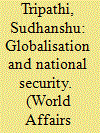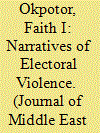|
|
|
Sort Order |
|
|
|
Items / Page
|
|
|
|
|
|
|
| Srl | Item |
| 1 |
ID:
101012


|
|
|
|
|
| Publication |
2010.
|
| Summary/Abstract |
This article aims at analysing different, partly overlapping and partly competing European security discourses that have emerged on the Iranian nuclear issue since 2003. Three main discursive themes have been singled out exemplifying the main identity representations of Iran and Europe, the main stances towards Iran and the representations of the nature of European foreign policy. Over the years, the coercive-securitisation discourse has become hegemonic over democracy promotion and cultural diplomacy-inspired discourses and European policies have consistently followed suit. In terms of security governance, the European Union (EU) has created a format for negotiations, which has undergone subsequent enlargements, consistent with its securitised but multilateral discourses. While the nature of the collegial security governance espoused has brought positive effects in terms of reinforcing the EU's own identity as an international actor both inside and outside, the resilience of the first discursive theme throughout the process despite other international actors' dissonance signals that a more comprehensive and inclusive discourse towards the Iranian nuclear issue has failed to emerge.
|
|
|
|
|
|
|
|
|
|
|
|
|
|
|
|
| 2 |
ID:
133571


|
|
|
|
|
| Publication |
2014.
|
| Summary/Abstract |
Sudhanshu Tripathi historicises and contextualises contemporary views and discussions about globalisation and introduces its discourses, politics, practices and technologies. He also analyses the emerging challenges to as well as dilemmas and prospects of the ongoing process.
|
|
|
|
|
|
|
|
|
|
|
|
|
|
|
|
| 3 |
ID:
175827


|
|
|
|
|
| Summary/Abstract |
This article addresses post-election violence (PEV) in Africa by drawing on the lived experiences of respondents in Côte d’Ivoire and Nigeria. It takes an actor-centered approach steeped in interpretivism and reflexivity in analyzing Côte d’Ivoire’s 2010–2011 and Nigeria’s 2011 PEV. It examines PEV from the viewpoint of a variety of actors, including political party leaders, party activists, electoral commission officials, non-governmental organization (NGO) officials, academics, scholars, and human rights experts. With attention to methodological and personal positionality, the study draws on interviews conducted in 2014 and 2015. It also analyzes the dominant discourses that contributed to a violent reaction to a contested election outcome, and thus highlights the socially-constructed conditions that allow for the possibility of violence. Salient issues arising from these narratives include: the role of decades-long unresolved violence episodes in fueling PEV, the role of political leaders in exploiting grievances associated with these past violence episodes, and the power of electoral violence prevention strategies targeted at principal actors in curbing the progression to violence.
|
|
|
|
|
|
|
|
|
|
|
|
|
|
|
|
| 4 |
ID:
142680


|
|
|
|
|
| Summary/Abstract |
This essay aims to understand how the complex configurations of welfare shape and change the identity of carers, and the conditions and relations in the policy and practice of social care. It is based on the analysis of interviews with mothers of children with disabilities, collected in 2006 and 2008 in Russia, as well as analysis of more recent material in the public sphere (blogs and electronic mass media). In the interviews and blogs, women tell their stories about their experience of social exclusion and choice. The analysis shows how welfare institutions and discourses work to secure the well-being of citizens, to construct social inequality, to define the ways people think about normality and shape their identities and lives.
|
|
|
|
|
|
|
|
|
|
|
|
|
|
|
|
| 5 |
ID:
191784


|
|
|
|
|
| Summary/Abstract |
Researchers have argued that religion has direct and indirect connections with nationalism, and they have called for conceptual clarity about the role of religion in the construction of nationalism. I extend the insights of this scholarship into reevaluating the alteration of ethnic nationalism in Korea. Drawing on interviews with evangelical Protestant women attending a megachurch in Seoul, this study explores who evangelical women are willing to include as members of Korea and in what conditions the women are inclined to include these individuals. My findings suggest that women use evangelical mission work as a rhetorical device to create a broader membership category, regardless of skin color, to imagine members of Korea. Women’s participation in volunteer works shapes their expectation of immigrants’ appreciation of Korean language, food, and civic etiquette. Challenging the prevalent view that ethnic nationalism is declining, I argue that it has survived but shifted its focus from bloodline to ethnic culture.
|
|
|
|
|
|
|
|
|
|
|
|
|
|
|
|
| 6 |
ID:
182614


|
|
|
|
|
| Summary/Abstract |
The European refugee crisis has been communicated visually through images such as those of Alan Kurdi lying dead on the beach, by body bags on the harbor front of Lampedusa, by people walking through Europe and by border guards and fences. This article examines the broader visual environment within which EU policy-making took place from October 2013 to October 2015. It identifies ‘tragedy’ as the key term used by the EU to explain its actions and decisions and points out that discourses of humanitarianism and border control were both in place. The article provides a theoretical account of how humanitarianism and border control might be visualized by news photography. Adopting a multi-method design and analyzing a dataset of more than 1000 photos, the article presents a visual discourse analysis of five generic iconic motifs and a quantitative visual content analysis of shifts and continuity across four moments in time. The article connects these visual analyses to the policies and discourses of the EU holding that the ambiguity of the EU’s discourse was mirrored by the wider visual environment.
|
|
|
|
|
|
|
|
|
|
|
|
|
|
|
|
| 7 |
ID:
111544


|
|
|
|
|
| Publication |
2012.
|
| Summary/Abstract |
States are finding it increasingly difficult to provide good governance in response to today's problems in a globalised world, as they are often either too small or too big to cope with current crises. One of the strategies of states to remedy this situation is to construct regional levels of governance at the supranational or national level. This has led to the creation of diverse forms of regional governance worldwide, thereby ushering in a neo-Westphalian world of states and regions. In order to advance the research agenda of comparative regionalism, scholars need to 'unpack' regions along several conceptual dimensions. This includes seeing regions as economic areas, public goods spaces as well as actors in the international arena. In addition, a distinction needs to be made in studying the projects, processes and products of region building. Moreover, studying regions needs to take into account the discursive context of 'regionalism speak'. Finally, more attention needs to be dedicated to the internal complexity of regionalisms. In sum, comparing regions is not a straightforward exercise, and in some case regions should not be compared with other regions, but with states.
|
|
|
|
|
|
|
|
|
|
|
|
|
|
|
|
|
|
|
|
|